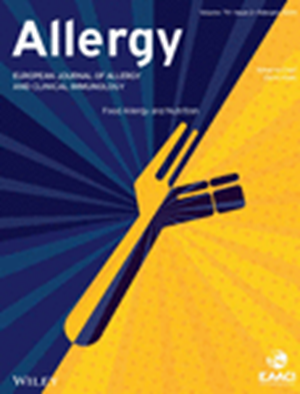Examining Atopic Dermatitis Through the One Health Concept Lens.
IF 12
1区 医学
Q1 ALLERGY
引用次数: 0
Abstract
This paper explores the application of the One Health framework to atopic dermatitis (AD), a complex, chronic skin disease, emphasizing interdisciplinary approaches to prevention and management. One Health integrates human, animal, environmental, and plant health, addressing challenges such as antimicrobial resistance, infectious diseases, and neglected tropical diseases (NTDs). In the context of AD, One Health principles are applied to explore etiological factors like urbanization, climate change, biodiversity loss, and environmental pollution. Key findings include the interplay between lifestyle and environmental exposures, as evidenced by studies on human-dog microbiota sharing, which reveal that rural environments confer protective effects against allergic conditions for both species. Historical observations of the "old farm effect" highlight the protective role of traditional rural living, including raw milk consumption, in preventing atopic diseases. However, modern urbanization and industrial farming have eroded these benefits. Climate change intensifies AD symptoms through extreme weather, proliferation of more and higher allergenic pollen, likely also of house dust mites, allergen proliferation, and pollution. Rising CO2 levels exacerbate pollen allergenicity, prolong pollen seasons, and amplify allergic responses. The skin's microbiome and immune barrier are sensitive to pollutants like black carbon and traffic-related emissions, further influencing AD prevalence and severity. Innovative approaches to prevention, such as veterinary vaccination strategies targeting allergens or immunopathological key cytokines, illustrate cross-species solutions. Web data mining demonstrates potential for analyzing public interest and seasonal trends in AD, correlating search data with real-time monitored environmental factors and highlighting gaps in awareness and access to modern treatments. This integrative One Health lens provides a framework for reimagining AD prevention and management, emphasizing a return to environmental and lifestyle diversity, climate action, and leveraging digital and biomedical tools for personalized, sustainable care.通过一个健康概念透镜检查特应性皮炎。
本文探讨了一个健康框架在特应性皮炎(AD)的应用,这是一种复杂的慢性皮肤病,强调跨学科的预防和管理方法。“同一个健康”整合了人类、动物、环境和植物健康,应对抗菌素耐药性、传染病和被忽视的热带病等挑战。在AD的背景下,同一个健康原则被应用于探讨病因因素,如城市化、气候变化、生物多样性丧失和环境污染。主要发现包括生活方式和环境暴露之间的相互作用,正如对人狗微生物群共享的研究所证明的那样,这表明农村环境对两种物种的过敏状况都具有保护作用。对“老农场效应”的历史观察强调了传统农村生活(包括食用生奶)在预防特应性疾病方面的保护作用。然而,现代城市化和工业化农业已经侵蚀了这些好处。气候变化通过极端天气、更多和更高的过敏原花粉(也可能是室内尘螨)的增殖、过敏原增殖和污染加剧了AD症状。二氧化碳浓度的上升加剧了花粉的过敏原性,延长了花粉季节,并放大了过敏反应。皮肤的微生物群和免疫屏障对黑碳和交通相关排放物等污染物很敏感,这进一步影响了AD的患病率和严重程度。创新的预防方法,如针对过敏原或免疫病理关键细胞因子的兽医疫苗接种策略,说明了跨物种解决方案。网络数据挖掘显示了分析公众兴趣和AD季节性趋势的潜力,将搜索数据与实时监测的环境因素联系起来,并突出在认识和获得现代治疗方面的差距。这种一体化的“同一个健康”镜头为重新构想AD的预防和管理提供了一个框架,强调回归环境和生活方式多样性,采取气候行动,并利用数字和生物医学工具实现个性化、可持续的护理。
本文章由计算机程序翻译,如有差异,请以英文原文为准。
求助全文
约1分钟内获得全文
求助全文
来源期刊

Allergy
医学-过敏
CiteScore
26.10
自引率
9.70%
发文量
393
审稿时长
2 months
期刊介绍:
Allergy is an international and multidisciplinary journal that aims to advance, impact, and communicate all aspects of the discipline of Allergy/Immunology. It publishes original articles, reviews, position papers, guidelines, editorials, news and commentaries, letters to the editors, and correspondences. The journal accepts articles based on their scientific merit and quality.
Allergy seeks to maintain contact between basic and clinical Allergy/Immunology and encourages contributions from contributors and readers from all countries. In addition to its publication, Allergy also provides abstracting and indexing information. Some of the databases that include Allergy abstracts are Abstracts on Hygiene & Communicable Disease, Academic Search Alumni Edition, AgBiotech News & Information, AGRICOLA Database, Biological Abstracts, PubMed Dietary Supplement Subset, and Global Health, among others.
 求助内容:
求助内容: 应助结果提醒方式:
应助结果提醒方式:


